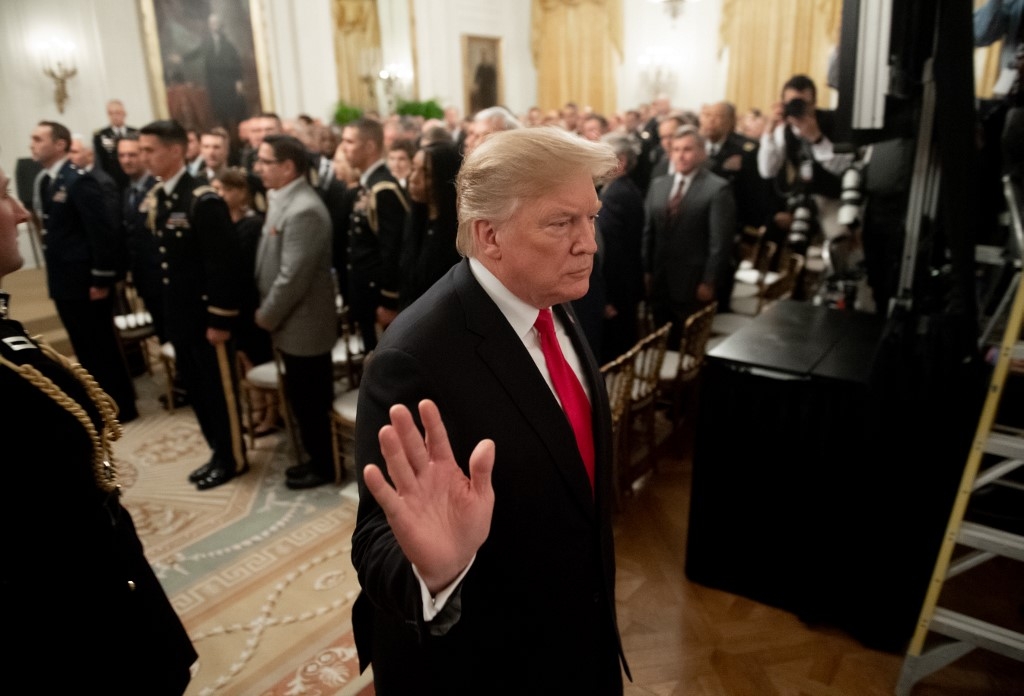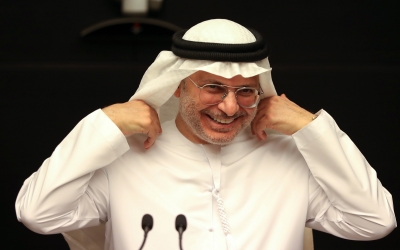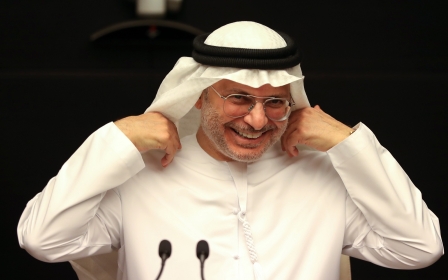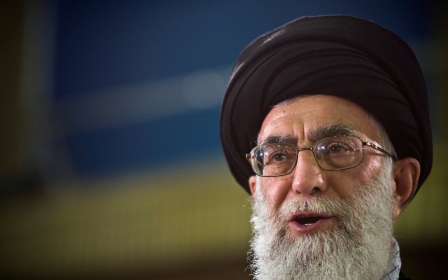Trump rejects reports of 'infighting' as allies push back against anti-Iran rhetoric

Donald Trump disputes recent reports that his policies regarding Iran have led to "infighting" amid an uptick in tensions and heated rhetoric between Washington and Tehran.
In a series of tweets on Wednesday, the US president said "there is no infighting whatsoever".
"Different opinions are expressed and I make a decisive and final decision - it is a very simple process. All sides, views, and policies are covered," he said.
"I'm sure that Iran will want to talk soon," Trump added.
....Different opinions are expressed and I make a decisive and final decision - it is a very simple process. All sides, views, and policies are covered. I’m sure that Iran will want to talk soon.
— Donald J. Trump (@realDonaldTrump) May 15, 2019
New MEE newsletter: Jerusalem Dispatch
Sign up to get the latest insights and analysis on Israel-Palestine, alongside Turkey Unpacked and other MEE newsletters
It was not clear whether Trump was referring to infighting within his own administration, or between the United States and its allies.
However, both the New York Times and Washington Post published articles on Wednesday alleging that American allies have pushed back against recent US-led escalation with Iran.
In his tweets, Trump called both publications "fake news", a phrase the US president used earlier this week to describe a New York Times report that claimed he was considering sending 120,000 troops to the region to prepare for a military confrontation with Iran.
Allies push back
The Trump administration has alleged that Iran or its allied forces could launch an imminent attack on American troops or US allies in the region.
While that claim has not been proven, it prompted the US to send an aircraft carrier and a naval strike group to the Gulf to give a "clear and unmistakable message to the Iranian regime".
European Union chief Federica Mogherini said on Monday that she does not want to see a military escalation between the US and Iran.
Mogherini told US Secretary of State Mike Pompeo, who made a quick stop in Brussels this week, to use "maximum restraint" towards Iran, a play on the US's self-described "maximum pressure campaign" against the country.
Similarly, Germany's foreign affairs committee chair Norbert Rottgen said that German intelligence doesn't align with the US view that a military strike by Iran is soon approaching.
Instead, Rottgen described recent US rhetoric as "saber rattling".
On Tuesday, Spain ordered a naval frigate to leave the Gulf, in an effort to show that the country is not part of the US military presence there.
That same day, a top British general in the US-led operation to combat the Islamic State (IS) group in Iraq and Syria blew a hole in the Trump administration's assertion that Iran-allied militias were mobilising to attack US forces.
Major General Christopher Ghika said he has seen no recent worrisome activity by the Popular Mobilisation Forces (PMF), an umbrella organisation of Shia armed groups loosely affiliated with Iran.
The United Arab Emirates, a key US ally in the region, has even said it is committed to a "de-escalation" with Iran.
The UAE's minister of state for foreign affairs, Anwar Gargash, said on Wednesday that, "we need to emphasise caution and good judgment. It is easy to throw accusations but it is a difficult situation".
US undeterred
Still, that hasn't stopped the US from moving ahead with its claims against Iran.
US government officials accused Iran - or its proxies - of "sabotaging" four oil tankers near the UAE over the weekend, despite the fact that an investigation into the incident is ongoing.
The officials admitted that they have no hard evidence to prove their claim.
On Wednesday, the US ordered non-essential government staff to leave Iraq over what it said is an increased threat of attack.
Iraqi officials have questioned the threat described by the Americans, however, the New York Times reported on Wednesday.
This is the latest round of escalating tensions with Iran, which Trump has targeted since coming into office.
The US administration has backed out of the 2015 Iran nuclear deal, slapped stringent sanctions targeting the country's economy, placed Iran's Revolutionary Guards on its terrorist list and pressured US allies to stop trading with Iran.
Iran, for its part, has designated all US troops stationed in the region as terrorists.
On the one-year anniversary of the US pullout of the nuclear accord, Iran announced it planned to back out of parts of that agreement and pledged to enrich uranium.
Middle East Eye delivers independent and unrivalled coverage and analysis of the Middle East, North Africa and beyond. To learn more about republishing this content and the associated fees, please fill out this form. More about MEE can be found here.






